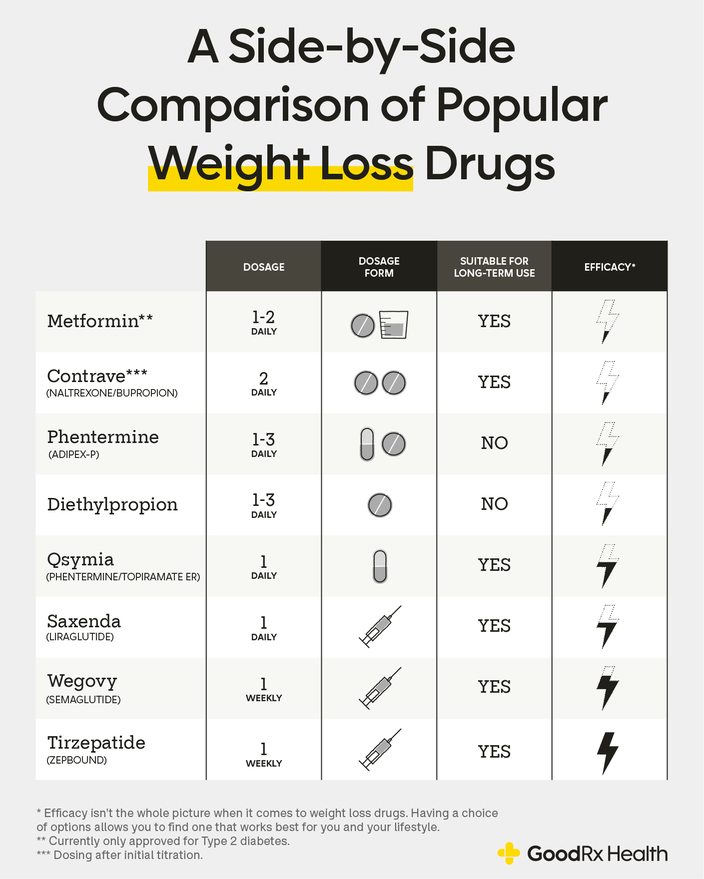
The Latest Updates: 14 New Weight Loss Drugs on the Horizon
Key takeaways:
Researchers are studying several weight loss pills in clinical trials. Medications such as oral semaglutide, orforglipron, and amycretin have notable supporting data so far.
There are other promising new weight loss drugs in the works too. Injectables, such as retatrutide, CagriSema (cagrilintide and semaglutide), and MariTide (maridebart cafraglutide), are in more advanced clinical trials.
More than ten medications are already FDA approved for weight loss. Wegovy (injectable semaglutide), Saxenda (liraglutide), and Zepbound (tirzepatide) are common examples.
Save on popular GLP-1 Agonists
Take control of your health. With GoodRx, you may be eligible to save even more on popular treatments.

There’s not a body out there that’s better than your own. It’s the vehicle that takes you through life. And no matter what size, shape, or height it is, there are countless reasons to be proud of it.
Still, some internal or external factors may be driving you to try to lower your body weight. Perhaps, it’s wanting to improve your body image. Or maybe it’s related to a health issue your prescriber warned you about. Regardless, there are steps you can take to help you meet your health goals.
When possible, a healthy diet and exercise are ideal ways to lose body weight. But, if needed, medication is another way to help promote weight loss. While there are multiple weight loss medications already on the market, there are also several promising treatments in clinical trials.
1. Oral semaglutide
What it is: Oral semaglutide is a glucagon-like peptide-1 (GLP-1) agonist. It mimics the effects of GLP-1, a gut hormone that's involved in blood glucose (sugar) control, digestion, and appetite management.
How it’s administered: Oral semaglutide is a tablet that’s taken once daily.
Status: Novo Nordisk — the manufacturer of oral semaglutide — was reportedly planning on applying for FDA approval for weight management in 2023. The FDA would need several months to review the application after that.
Effectiveness: Oral semaglutide was studied for weight loss in a phase 3 study called OASIS 1. People taking semaglutide 50 mg once daily lost up to 15% of their initial body weight after about 15 months (68 weeks) of use. This is comparable to Wegovy’s weight loss benefits, which is an injectable version of semaglutide.
Other considerations: Semaglutide is already available in the form of three FDA-approved products: Ozempic, Rybelsus, and Wegovy. Ozempic, an injectable medication, and Rybelsus, an oral tablet, are both approved to treat Type 2 diabetes. Wegovy is approved for chronic weight management.
Latest news on oral semaglutide
September 25, 2023
According to a recent FDA inspection report, bacteria was found in certain batches of oral semaglutide at a plant in North Carolina. This situation is still being addressed, but Novo Nordisk reportedly has corrective action plans in place.
Experts don’t expect this issue to affect the U.S. supply of Rybelsus.
2. Orforglipron
What it is: Orforglipron is an oral GLP-1 agonist. Unlike injectable GLP-1 agonists, it’s made of chemicals — not peptides (amino acid chains). This helps it survive in your stomach better.
How it’s administered: Orforglipron is an oral capsule that’s taken once daily.
Status: A phase 3 study for orforglipron is underway for chronic weight management in adults. It kicked off in June 2023, and it’s set to run until mid 2027.
Effectiveness: A phase 2 trial found that orforglipron may help people lose up to 15% of their body weight after about 8 months (36 weeks).
Other considerations: Because of its design, some experts predict that orforglipron will be easy to produce in bulk. Meanwhile, competitor GLP-1 agonists, such as Wegovy, are peptides that are relatively hard to make. In turn, this may translate to orforglipron being a more affordable weight loss medication.
Latest news on orforglipron
December 8, 2023
A recent systematic review of seven studies found that people taking orforglipron for chronic weight management or Type 2 diabetes experienced significantly more weight loss than people taking a placebo pill.
Some side effects were noted in the review, too. People taking orforglipron had a significantly higher risk of developing gut-related side effects (such as nausea, diarrhea, constipation) or side effects that made them stop taking the medicine. This is early data, though. The authors noted that more research is still needed to look into the safety and effectiveness of oral GLP-1 agonists.
The same findings apply to danuglipron, discussed next.
3. Danuglipron
What it is: Danuglipron is an oral GLP-1 pill. It works the same way as orforglipron.
How it’s administered: Danuglipron is an oral tablet. Initially studied as a twice-daily medication, a once-daily version is now in development.
Status: Danuglipron recently completed its phase 2 studies. But the data was mixed, so Pfizer — danuglipron’s manufacturer — is now studying the benefits and risks of a once-daily version.
Effectiveness: Compared to placebo, twice-daily danuglipron helped people lose up to 13% of their initial body weight after 32 weeks (7 months) of treatment. At this time, we don’t know how effective the once-daily version of danuglipron will be.
Latest news on danuglipron
December 1, 2023
Pfizer recently announced that the twice-daily version of danuglipron won’t advance to phase 3 clinical trials. This is because more than half of people ended up stopping the medication in a phase 2 trial due to side effects. The most common side effects were nausea, vomiting, and diarrhea.
This isn’t the end of the road for danuglipron. Pfizer is pivoting to a once-daily formulation, and initial data is expected in the first half of 2024.
4. APH-012
What it is: APH-012 is an oral medicine that imitates the metabolic effects of gastric bypass (weight loss) surgery. It’s a glucose pill that’s designed to stimulate certain parts of your small intestine.
How it’s administered: APH-012 is a once-daily oral medication. Its manufacturer is calling it a distal jejunal-release dextrose bead.
Status: APH-012’s phase 2 trial is ongoing. It’s set to run through March 2024. If data ends up being positive, a phase 3 study would likely come next.
Effectiveness: We don’t know exactly how effective APH-012 will be. Initial effectiveness data is expected by early 2024.
Latest news on APH-012
There is no recent news for APH-012.
5. ARD-101
What it is: ARD-101 is an oral medication. It targets “bitter taste receptors” in your gut and activates appetite-suppressing hormones such as GLP-1, glucagon-like peptide-2 (GLP-2), and cholecystokinin.
How it’s administered: ARD-101 is an oral pill that’s taken twice daily.
Status: ARD-101 is enrolled in three phase 2 studies. Two are already completed, and the third is set to conclude in March 2024.
Effectiveness: Current data suggests that ARD-101 reduces hunger 2.5 times more than placebo among adults who have obesity. This may lead to weight loss.
Other considerations: ARD-101 may help reduce hunger and cravings following weight loss surgery in adults. And it may have similar effects for people living with Prader-Willi syndrome (PWS), a genetic condition that causes a hard-to-satisfy appetite.
Latest news on ARD-101
October 9, 2023
ARD-101 is being studied for three possible uses. But its potential to treat PWS is turning heads. ARD-101’s manufacturer recently announced that the medication secured two regulatory designations from the FDA for PWS:
Orphan Drug: This status is given to certain medications in development for rare health conditions. It helps speed up the FDA approval process, and it also comes with financial incentives.
Rare Pediatric Disease: This status is awarded to certain medications that treat serious health conditions in kids and teens. It helps speed up the FDA review process.
6. Oral amycretin
What it is: Amycretin is an oral medication that’s being developed for chronic weight management. It’s a dual GLP-1 and amylin agonist. Amylin is a hormone that helps you feel more full after meals.
How it's administered: Amycretin is a once-daily oral tablet. But an under-the-skin amycretin injection is being developed too.
Status: Amycretin completed a phase 1 trial in December 2023. A phase 2 study is expected to begin in the second half of 2024.
Effectiveness: Early phase 1 data suggests that amycretin may give semaglutide a run for its money. In the study, people lost an average of 13% of their initial body weight after 12 weeks (3 months) of use.
Latest news on amycretin
April 1, 2024
Amycretin is still in its early stages of development, but leaders at Novo Nordisk are keen on its potential. An executive at the company recently predicted that amycretin will likely be available sometime this decade (before 2030).
Additional studies are needed before an approval would take place, though. Phase 2 results are expected by early 2026, and phase 3 study would come next.
7. Retatrutide
What it is: Retatrutide is a medication that’s being studied for weight loss and Type 2 diabetes in adults. Retatrutide works by attaching to three receptors (proteins): GIP (glucose-dependent insulinotropic polypeptide), GLP-1, and glucagon.
How it’s administered: Retatrutide is an injectable medication that’s administered under the skin once weekly.
Status: A phase 3 weight loss study is currently in process. It’s set to finish by early 2026. If data is positive, a FDA approval request will likely follow.
Effectiveness: Eli Lilly, the manufacturer of retatrutide, estimates that the medication may help people lose up to 24% of their initial body weight after about 11 months (48 weeks). It may be even more effective than tirzepatide (Zepbound) for weight loss. Other papers speak to its significant weight loss benefits, too.
Latest news on retatrutide
November 16, 2023
Researchers from Virginia Commonwealth University recently shared findings that suggest retatrutide can help reduce liver fat levels. A new analysis of a phase 2 trial found that more than 85% of people who received retatrutide for 48 weeks saw their fatty liver disease go away (resolve).
For context, people who are considered obese have a higher risk of developing fatty liver disease. If left unmanaged, it could eventually lead to liver scarring or other health complications.
8. CagriSema
What it is: CagriSema is a combination treatment that combines two injectable medications (cagrilintide and semaglutide) into one. Cagrilintide mimics amylin, while semaglutide mimics GLP-1.
How it’s administered: CagriSema is an injectable medication that’s administered under the skin once weekly.
Status: A phase 3 weight loss study started in November 2022. It’s scheduled to run until October 2026.
Effectiveness: Phase 2 study results suggest that CagriSema leads to significantly more weight loss than cagrilintide and semaglutide by themselves. After about 7 months (32 weeks), adults receiving weekly CagriSema lost an average of 15% of their initial body weight.
Latest news on CagriSema
November 16, 2023
CagriSema’s manufacturer, Novo Nordisk, is looking to see if their medication is more effective than Zepbound (tirzepatide) — a medication that was approved for chronic weight management in November 2023. They recently kicked off a phase 3 study that will directly compare the safety and effectiveness of these two treatments for weight management. The study is set to last for about 1.5 years.
9. Ecnoglutide
What it is: Ecnoglutide is another GLP-1 agonist; it’s thought to be a longer-lasting alternative to Saxenda (liraglutide). Saxenda is a once daily, injectable GLP-1 agonist that’s approved for weight loss.
How it’s administered: Ecnoglutide is an injectable medication that’s administered under the skin once weekly.
Status: Ecnoglutide is being studied in several China-based phase 3 studies for weight loss and Type 2 diabetes in adults. They’re scheduled to run until late 2024 and early 2025.
Effectiveness: In a phase 2 study, ecnoglutide led to larger reductions in body weight than Saxenda. People receiving weekly ecnoglutide lost up to 15% of their initial body weight after about 6 months (26 weeks); people receiving daily Saxenda lost up to 9%.
Latest news on ecnoglutide
April 1, 2024
An oral version of ecnoglutide (called XW004) recently posted encouraging phase 1 trial results. In this small 6-week study, people who received the once-daily tablet lost an average of nearly 7% of their initial body weight. Those who received placebo lost about 1% of their body weight over the same time frame. Additional studies are now on deck.
10. Mazdutide
What it is: Mazdutide is a GLP-1 agonist that also mimics glucagon. It’s being studied for weight loss and Type 2 diabetes in adults.
How it’s administered: Mazdutide is an injectable medication that’s administered under the skin once weekly.
Status: Mazdutide is enrolled in several phase 3 studies in China. They’re set to run through 2024 and 2025.
Effectiveness: Phase 2 study results suggest that mazdutide promotes more weight loss than placebo. After about 6 months (24 weeks), people receiving mazdutide lost about 15% more of their body weight than people receiving placebo. A more recent phase 3 study posted similar results, but detailed findings will be published later in 2024.
Latest news on mazdutide
February 1, 2024
Innovent Biologics, mazdutide’s manufacturer, recently announced that they’re applying for the medication’s approval in China. The submission is for chronic weight management in adults who are considered overweight or obese.
At this time, it’s not entirely clear when the medication might be submitted to the FDA for approval.
11. Survodutide
What it is: Survodutide activates GLP-1 and glucagon receptors, similar to mazdutide.
How it’s administered: Survodutide is an injectable medication that’s administered under the skin once weekly.
Status: Survodutide recently completed its phase 2 clinical studies. Phase 3 studies are set to run from November 2023 through January 2026.
Effectiveness: Participants in a recent phase 2 study lost up to 19% of their initial body weight after using survodutide for about 10 months (46 weeks). Everyone in the study either had overweight or obesity.
Latest news on survodutide
April 12, 2024
Survodutide may be able to treat metabolic dysfunction-associated steatohepatitis (MASH), a form of fatty liver disease. People who are considered overweight or obese have a higher risk for developing MASH.
In a recent 48-week phase 2 study, over 80% of people who received survodutide experienced significant improvements in their liver biopsy reports. By comparison, nearly 20% of people receiving a placebo saw similar results.
12. VK2735
What it is: VK2735 is a GLP-1/GIP agonist medication, similar to tirzepatide.
How it's administered: VK2735 is injected under the skin once weekly. A tablet version of the medication is also in the works, but it’s in earlier stages of development.
Status: Injectable VK2735 is currently enrolled in a phase 2 trial for weight loss. The study kicked off in September 2023, and it’s set to end during the first half of 2024. Initial data will likely be reported shortly after the study wraps up.
Effectiveness: Interim phase 2 data found that injectable VK2735 helped people lose up to nearly 15% of their initial body weight after 13 weeks (3 months) of use. More complete data should be posted in the coming weeks.
Latest news on VK2735
April 1, 2024
Viking Therapeutics, the manufacturer of VK2735, recently announced preliminary data for the oral formulation of this medication. In a phase 1 study, VK2735 tablets helped people lose about 5% of their initial body weight after 1 month of use. Oral VK2735’s phase 2 trial is set to start during the second half of 2024.
13. MariTide
What it is: MariTide is short for maridebart cafraglutide. It’s an injectable medication that mimics GLP-1 but blocks GIP. This is a different approach from medications such as tirzepatide and VK2735. Some genetic research suggests that blocking GIP in the gut may lead to less fat storage. MariTide is being studied for chronic weight management.
How it's administered: MariTide is injected under the skin. A big part of what makes it unique is its frequency of administration, as it’s only injected once a month.
Status: MariTide is currently enrolled in a phase 2 clinical trial. The main part of the study should be wrapped up by late 2024.
Effectiveness: In a phase 1 study, three doses of MariTide helped people lose up to nearly 15% of their initial body weight after 3 months of use. It may help people maintain their results over time, too. Results for many people persisted for 5 months after their last dose.
Latest news on MariTide
April 1, 2024
MariTide’s manufacturer, Amgen, is expecting to release phase 2 trial results by the end of 2024. This information will build upon what we currently know about MariTide’s potential for chronic weight management.
14. Bimagrumab
What it is: Bimagrumab is a biologic medication. It blocks activin receptors to help encourage weight loss and lean muscle growth. If approved, it’d be the first weight loss medication of its kind.
How it’s administered: Bimagrumab is injectable medication that’s infused into a vein once a month.
Status: Bimagrumab’s current phase 2 study is set to run until June 2025. It’s being studied by itself and in combination with Wegovy.
Effectiveness: A previous phase 2 study found that bimagrumab helped adults with Type 2 diabetes and overweight lose about 20% of their total body fat mass over about 11 months (48 weeks). They also had more than a 3% increase in lean muscle mass. Together, these changes led to a 6% to 7% reduction in body weight.
Latest news on bimagrumab
July 14, 2023
Bimagrumab was initially developed by companies called MorphoSys and Novartis. It was sold to a different company, Versanis Bio, in 2021.
It’s changing hands again. Versanis Bio was recently acquired by Eli Lilly. Eli Lilly makes medications such as Zepbound, Trulicity (dulaglutide), Humalog (insulin lispro), and more.
What medications are already FDA approved for weight loss?
As of April 2024, 11 medications are FDA approved as weight loss treatments. Some are only meant for short-term use, while others can be used for weight management over time.
Medication | Dosage form | How it works |
|---|---|---|
Contrave (naltrexone / bupropion) | Tablet | Lessens hunger and manages cravings |
Qsymia (phentermine / topiramate ER) | Capsule | Lessens hunger and manages cravings |
Orlistat (Alli, Xenical) | Capsule | Blocks fat absorption from your diet |
Phentermine (Adipex-P, Lomaira)* | Tablet or capsule | Lowers appetite |
Tablet or capsule | Lowers appetite | |
Tablet | Lowers appetite | |
Tablet | Lowers appetite | |
Zepbound (tirzepatide) | Injection | Lowers appetite and food intake, helps you feel full |
Wegovy (semaglutide) | Injection | Lowers appetite and food intake, helps you feel full |
Saxenda (liraglutide) | Injection | Lowers appetite and food intake, helps you feel full |
Imcivree (setmelanotide) | Injection | Used only to treat certain genetic conditions, lowers appetite, increases energy use |
*Only meant for short-term use
Are there medications that are used off label for weight loss?
Yes, many medications are prescribed off label for weight loss. In most cases, they’re prescribed because they cause weight loss as a side effect. These are some top examples:
Pramlintide (Symlin)
Topiramate (Topamax)
Bupropion (Wellbutrin SR, Wellbutrin XL)
Zonisamide (Zonegran)
Note: You should never take medication for weight loss purposes without talking to your healthcare professional first. Many of these medications have risks and side effects to keep in mind.

The bottom line
Several new weight loss drugs are making waves in clinical trials. This includes pills such as oral semaglutide, orforglipron, and amycretin. The same goes for injectable medications, such as retatrutide, CagriSema (cagrilintide and semaglutide), and MariTide (maridebart cafraglutide).
Zepbound (tirzepatide), Wegovy (semaglutide), Saxenda (liraglutide), and more are already FDA approved as weight loss treatments. Your healthcare professional can tell you if weight loss medication is right for you.
References
Aardvark Therapeutics, Inc. (2023). Aardvark Therapeutics announces FDA orphan drug designation granted to ARD-101, a novel drug candidate for Prader-Willi syndrome. PR Newswire.
Aardvark Therapeutics, Inc. (2023). Aardvark Therapeutics announces receipt of FDA rare pediatric disease designation for Prader-Willi syndrome and expands the ongoing phase 2 clinical trial.
Aardvark Therapeutics, Inc. (2022). Aardvark Therapeutics announces the initiation of enrollment for three phase 2 clinical trials of oral ARD-101. PR Newswire.
Aardvark Therapeutics, Inc. (2023). Aardvark Therapeutics reports positive phase II clinical data for ARD-101. PR Newswire.
American Diabetes Association. (2023). American Diabetes Association highlights novel agent retatrutide which results in substantial weight reduction in people with obesity or Type 2 diabetes during late breaking symposium.
Aphaia Pharma. (n.d.). Our approach.
Aphaia Pharma. (n.d.). Programs.
Aphaia Pharma. (2023). Aphaia Pharma announces dosing of first patient in its phase 2 trial evaluating its lead candidate APH-012 for prediabetes. BioSpace.
Boehringer Ingelheim. (2023). Data shows nearly 19% weight loss in people with overweight or obesity in Boehringer Ingelheim and Zealand Pharma Phase II trial with survodutide (BI 456906). Business WIre.
Cardiometabolic Health Congress. (2023). Pfizer’s danuglipron enters the GLP-1 weight-loss race.
Clinicaltrials.gov. (n.d.). Study results for ARD-101. U.S. National Library of Medicine.
Clinicaltrials.gov. (n.d.). Study results for ecnoglutide. U.S. National Library of Medicine.
Clinicaltrials.gov. (2022). XW004 to evaluate the safety, tolerability, PK, and PD of oral ecnoglutide tablet in healthy adults. U.S. National Library of Medicine.
Clinicaltrials.gov. (2023). A research study to see how well CagriSema helps people with excess body weight lose weight (REDEFINE 1). U.S. National Library of Medicine.
Clinicaltrials.gov. (2023). A study of distal jejunal-release dextrose in obese participants. U.S. National Library of Medicine.
Clinicaltrials.gov. (2023). A study of IBI362 in participants with obesity or overweight. U.S. National Library of Medicine.
Clinicaltrials.gov. (2023). A study of oral ARD-101 in patients with Prader-Willi syndrome. U.S. National Library of Medicine.
Clinicaltrials.gov. (2023). A study of orforglipron (LY3502970) in adult participants with obesity or overweight with weight-related comorbidities (ATTAIN-1). U.S. National Library of Medicine.
Clinicaltrials.gov. (2023). A study of retatrutide (LY3437943) in participants with obesity and cardiovascular disease (TRIUMPH-3). U.S. National Library of Medicine.
Clinicaltrials.gov. (2023). A study to test whether BI 456906 helps people living with overweight or obesity who also have diabetes to lose weight (SYNCHRONIZE™-2). U.S. National Library of Medicine.
Clinicaltrials.gov. (2023). A study to test whether BI 456906 helps people living with overweight or obesity who do not have diabetes to lose weight (SYNCHRONIZE™-1). U.S. National Library of Medicine.
Clinicaltrials.gov. (2023). Research study to investigate how well semaglutide tablets taken once daily work in people who are overweight or living with obesity (OASIS 1) (OASIS 1). U.S. National Library of Medicine.
Clinicaltrials.gov. (2023). Safety and efficacy of bimagrumab and semaglutide in adults who are overweight or obese. U.S. National Library of Medicine.
Clinicaltrials.gov. (2023). Study to evaluate ARD-101 in adults receiving bariatric surgery. U.S. National Library of Medicine.
Dehestani, B., et al. (2021). Amylin as a future obesity treatment. Journal of Obesity and Metabolic Syndrome.
Endocrine Society. (2022). Pancreas hormones.
Frias, J. P., et al. (2023). Efficacy and safety of co-administered once-weekly cagrilintide 2·4 mg with once-weekly semaglutide 2·4 mg in type 2 diabetes: A multicentre, randomised, double-blind, active-controlled, phase 2 trial. The Lancet.
Gatlin, A. (2023). Novo Nordisk stock skids after FDA inspection turns up problematic bacteria in key plant. Investor’s Business Daily.
Hangzhou Sciwind Biosciences Co., Ltd. (2023). Sciwind Biosciences to highlight positive clinical data for GLP-1 peptide agonist ecnoglutide (XW003) at the American Diabetes Association (ADA) 83rd Annual Conference. PR Newswire.
Hendricks, E. J. (2017). Off-label drugs for weight management. Diabetes, Metabolic Syndrome and Obesity.
Heymsfield, S. B., et al. (2021). Effect of bimagrumab vs placebo on body fat mass among adults with Type 2 diabetes and obesity. Journal of the American Medical Association Network Open.
Innovent Biologics. (2023). Innovent announces phase 2 clinical study of higher dose 9 mg mazdutide (IBI362) in chinese adults with obesity achieved the 24-week primary endpoint. PR Newswire.
Jastreboff, A. M., et al. (2022). Triple–hormone-receptor agonist retatrutide for obesity — A phase 2 trial. The New England Journal of Medicine.
LaHucik, K. (2021). Versanis Bio snags $70M for a ditched Novartis muscle drug, with a little help from its old CEO Jimenez. Fierce Biotech.
Lilly. (2023). Lilly to acquire Versanis to improve patient outcomes in cardiometabolic diseases.
Muller, M. (2023). Novo’s Rybelsus plant had bacteria contamination, FDA says. Bloomberg Law.
Novo Nordisk Inc. (2023). Novo Nordisk A/S: Oral semaglutide 50 mg achieved 15.1% weight loss (17.4% if all people adhered to treatment) in adults with obesity or overweight in the OASIS 1 trial.
Pfizer. (2023). Pfizer provides update on GLP-1-RA clinical development program for adults with obesity and Type 2 diabetes mellitus.
Saxena, A. R., et al. (2023). Efficacy and safety of oral small molecule glucagon-like peptide 1 receptor agonist danuglipron for glycemic control among patients with Type 2 diabetes. Journal of the American Medical Association Network Open.
Sidik, S. (2023). Beyond Ozempic: Brand-new obesity drugs will be cheaper and more effective. Nature.
Veranis Bio. (2023). Versanis’ bimagrumab, first-in-class obesity therapy, enters Phase IIb of development. Pharmaceutical Technology.
Wharton, S., et al. (2023). Daily oral GLP-1 receptor agonist orforglipron for adults with obesity. The New England Journal of Medicine.
Zealand Pharma. (2023). Phase III studies to investigate survodutide for people living with obesity and overweight, with and without diabetes, cardiovascular disease and chronic kidney disease. Globe Newswire.

























